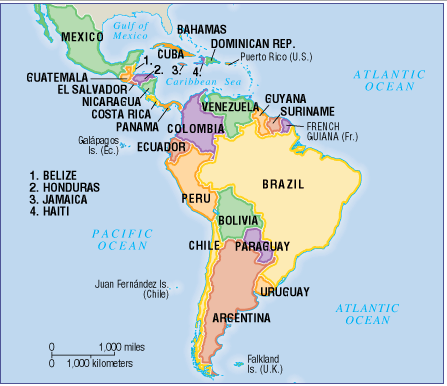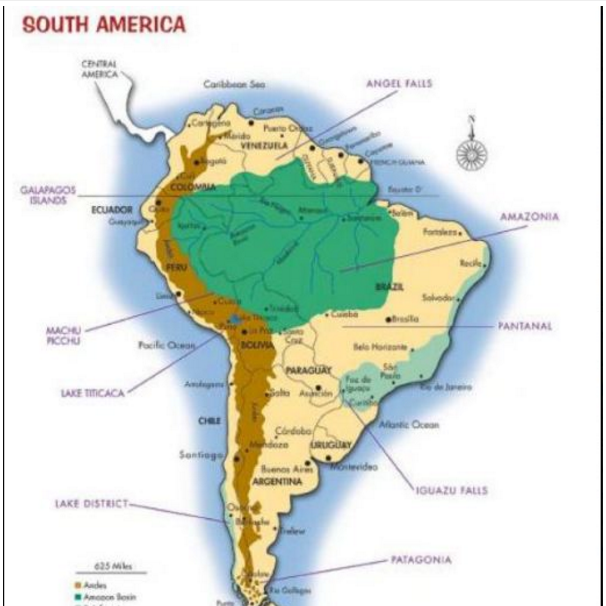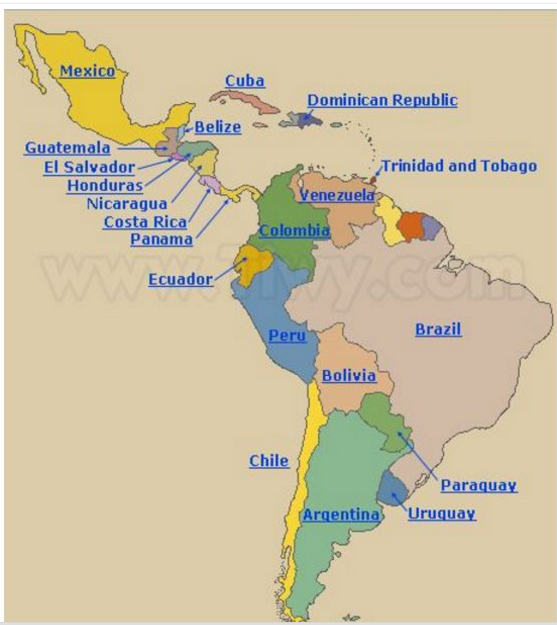Drug Trafficking and Terrorism in Latin America
A few weeks ago I uploaded a great article from Gatestone Institute, about the presence of the Shiite terrorist organization of Hezbollah in Venezuela, in order to do business with the drug cartels of Mexico. The article was written by Clare Lopez, an ex-CIA employee. See “The Hezbollah-Al Qaeda Axis”.
https://iakal.wordpress.com/2016/05/22/the-hezbollah-al-qaeda-axis/

http://www.classzone.com/cz/ot/political_maps/images/u3_Latin-America-Map.gif
This time I want to upload another great article about the connection between terrorism and drug trafficking from Gatestone Institute. See “Iran Trains Terrorists in Venezuela”, May 2011.
The article is written in 2011, before the improvement in the US-Iran and the US-Cuban relations, but it is a great article about the way terrorism and drug trafficking interact. The article writes about the very strong alliance between the Islamic socialists of Iran and the Communists of Venezuela and Cuba.
Iran, together with Venezuela, Cuba and Bolivia, have been supporting FARC, the communist terrorist and drug-trafficking organization of Colombia. The Communist narcoterrorists of FARC control the Colombian drug trade, and attack the American friendly government of Colombia. The Communists of FARC are mainly operating in south-eastern Colombia, in the jungles of the Amazon river, and in the north-western Colombia, at the mountain chain of the Andes (see following map).
Map 2 Latin America – The Jungles of Amazon and the Andes

http://3.bp.blogspot.com/-hVCnqLsuh7M/T8WqOzzSBGI/AAAAAAAAAC0/k9JZQkKOWE0/s1600/map.SAgeographical.png
Map 3

http://www.tiwy.com/pais/map_la.gif
The Communist narcoterrorists of FARC are controlling Colombia’s drug trafficking in the same way the Islamist narcoterrorists of Taliban are controlling the drug trafficking of Afghanistan. I think the main product of FARC is cocaine, while the main product of the Taliban is opium (heroin), but that’s of little importance. The Communist narcoterrorists of FARC are supported by the Islamosocialists of Iran, and the Communists of Venezuela, Cuba and Bolivia, while the Islamic narcoterrorists of Taliban are supported mainly by Pakistan and the Arabs of the Persian Gulf. Iran and the Taliban were bitter enemies, but now Iran has improved its relations with the Taliban, even though Pakistan is the main influence over the Taliban.
Also note that FARC is the 3rd richest terrorist organization in the world, with ISIS and Hamas being the richest and second richest ones. The Taliban are the 5th richest terrorist organization in the world. See “The 10 Richest Terrorist Organizations”
https://iakal.wordpress.com/2016/02/20/the-10-richest-terrorist-organizations/
I must also say that all the above countries, i.e. Iran, the Arabs of the Gulf, Venezuela, Bolivia, Cuba etc, passionately supported the Jewish Communist Bernie Sanders, in order to undermine the United States. Bernie Sanders had promised them to forbid production of oil and natural gas from shale rock in United States in case he was elected. See “American Politics in the Age of Oil”.
https://iakal.wordpress.com/2016/02/21/american-politics-in-the-age-of-oil-the-bernie-sanders-phenomenon/
Iran and the Arabs, together with the Communists of Latin America, have been also financing Communists in Europe. Remember that the Spanish Communists party of Podemos was caught taking money from Venezuela and Iran, in order to undermine Spain. Russia is normally financing national socialists in Europe, for example Marine Le Pen in France.
Articles
“The FARC and Colombia’s Illegal Drug Trade”, November 2014
37th Paragraph
Another estimate released in 2012 by the Colombian Attorney General’s Office put the FARC’s annual income—including drugs and all other illicit activities—at $1.1 billion.46 General José Roberto León, who was then director of Colombia’s national police force, told Reuters in 2013 that the FARC controls about 60 percent of the nation’s drug trade and earns about $1 billion per year from the industry.
https://www.wilsoncenter.org/sites/default/files/Otis_FARCDrugTrade2014.pdf
“Iran Trains Terrorists in Venezuela”, May 2011
3rd, 4th, 5th Paragraphs
Tehran is already preparing for this scenario with the help of Latin American countries such as Venezuela. Al-Seyassah has published reports about Iranian training camps on the border between Venezuela and Colombia, where Shiites from the Arab world are taught to make bombs, carry out assassinations, kidnap people and transport hostages to other locations. These training camps are run by Iranian Revolutionary Guards in cooperation with Hezbollah and Hamas.
The newspaper reports that the Shiite trainees fly to Caracas via Damascus, probably on the Venezuelan airline Conviasa, which covers the Caracas-Damascus-Tehran route. The weekly Conviasa's flights to Tehran are a cause for concern in Washington, due to the lack of transparency about what or whom they might be transporting.. The Kuwaiti paper mentions as well the trainees' presence in Colombia. The Iranian government allegedly enjoys in Latin America the support of the Revolutionary Armed Forces of the Colombian group, the FARC, which derives its primary source of income from drug trafficking. It is not a coincidence, therefore, that Al-Seyassah mentions that Iran finances its militias through narco-trafficking.
Iran's support in Latin America should worry the US. The Iranian regime is expanding its ties and its influence in the US's backyard, and helping groups such as Hezbollah and Hamas finding new safe havens for their terrorist activities. Recently, Uruguay also showed strong interest in strengthening relations with Teheran. The Uruguayan Foreign Minister even went so far as to hail Iran's role in the promotion of human rights in the world.
http://www.gatestoneinstitute.org/2094/iran-trains-terrorists-venezuela
“The 10 Richest Terrorist Organizations”
https://iakal.wordpress.com/2016/02/20/the-10-richest-terrorist-organizations/
“Cuba’s Support for Terrorism and the Venezuela-Iran Nexus”, May 2014
1st, 2nd Paragraphs
Iran, Cuba and Venezuela have developed a close and cooperative relationship against the U.S. and in support of terrorist groups and states. The three regimes increasingly coordinate their policies and resources in a three way partnership aimed at counteracting and circumventing U.S. policies in the Middle East and Latin America. Within this relationship, Cuba plays a strategic role in terms of geography (proximity to the U.S.), intelligence gathering (both electronic eavesdropping and human espionage) and logistics.
In addition to its proven technical prowess to interfere and intercept U.S. telecommunications, Cuba has deployed around the world a highly effective human intelligence network. The type of espionage carried out by Ana Belén Montes, the senior U.S. defense intelligence analyst who spied for Cuba during some 16 years until her arrest in 2001, has enabled the Castro regime to amass a wealth of intelligence on U.S. vulnerabilities as well as a keen understanding of the inner-workings of the U.S. security system. Such information and analysis was provided to Saddam Hussein prior to the U.S. invasion of Iraq and is being provided to a strategic ally like Iran.
7th Paragraph
Current and former members of Basque Fatherland and Liberty (ETA), a Basque terrorist organization continue to reside in Cuba. While some of these terrorists are on the island as part of an accord between the Cuban and Spanish governments, others are hiding in Cuba, fugitives of Spanish justice.
12th, 13th Paragraphs
On January 24, 2014 the Castro government decreed that it would now begin to freeze bank assets affiliated to Al-Qaeda in Cuba. The Castro regime tacitly admitted that they had been facilitating financing of terrorism.
“Hezbollah in Cuba,” the Hamas-funded Turkish “charity” known as IHH continues to operate in Havana. IHH is a member of the “Union of Good,” an umbrella organization that financially supports Hamas.
http://www.centerforsecuritypolicy.org/2014/05/02/cubas-support-for-terrorism-and-the-venezuela-iran-nexus/
“Hezbollah ‘Moving Freely’ in U.S. with Cuban-Made Venezuelan Passports”, February 2016
1st Paragraph
Members of Iran’s terror proxy Hezbollah “are moving freely” within the United States and Latin America, courtesy of Venezuelan passports issued by a Cuban company hired by Caracas, reports the UK-based Asharq Al-Awsat.
http://www.breitbart.com/national-security/2016/02/01/report-hezbollah-moving-freely-in-us-using-venezuelan-passports-issued-by-cuban-companies/
“The Iran-Cuba-Venezuela Nexus”, November 2014
1st Paragraph
Regular readers of this column will remember that in July the U.S. asked local officials here to arrest Venezuelan Gen. Hugo Carvajaland to extradite him on suspicion of drug trafficking with Colombian guerrillas. He was detained but the Netherlands stepped in, refused the extradition request and let him go.
7th, 8th Paragraphs
In Venezuela and Bolivia, Iran has moved to the next level, developing a military presence through joint ventures in defense industries. In Venezuela, the state of Aragua, where Mr. El Aissami is now governor, is ground zero for this activity.
Havana applauds this Islamic intervention. Since the rise ofchavismo, Cuba has supplied intelligence services to Venezuela and its regional allies, notably Nicaragua, Bolivia and Ecuador. Mr. Humire says it has also supplied passport-information technology to allow these countries to process individuals from the Middle East, hand out new documents and maintain the secrecy of true identities. Cuba has used this capacity to exchange information with like-minded nations, including Russia and Iran.
http://www.wsj.com/articles/mary-anastasia-ogrady-the-iran-cuba-venezuela-nexus-1416780671
“Venezuela Helped Argentina Protect Iranian Terrorists with Fake Passports”, March 2015
3rd Paragraph
The Veja report, translated from Portuguese to Spanish by Argentine news outlet Infobae, cites several officials described as “ex-members of Hugo Chávez’s cabinet” who now live in exile in Washington, D.C., after defecting from the current regime of President Nicolás Maduro. Those interviewed claim that “Argentine government representatives received large quantities of money from Iran,” and that Iran explicitly requested Argentina’s help in protecting Hezbollah terrorists responsible for the 1994 bombing of the Argentine Israel Mutual Association (AMIA), an attack that left 85 dead and dozens wounded.
http://www.breitbart.com/national-security/2015/03/16/report-venezuela-helped-argentina-protect-iranian-terrorists-with-fake-passports/
“Obama lands in Cuba as first US president to visit in nearly a century”, Μarch 2016
https://www.theguardian.com/world/2016/mar/20/barack-obama-cuba-visit-us-politics-shift-public-opinion-diplomacy
“Iranian-Sponsored Narco-Terrorism in Venezuela: How Will Maduro Respond”, April 2013
14th, 15th, 16th, 17th Paragraphs
Farah produced a research paper for the U.S. Army War College in August 2012 about the "growing alliance" between state-sponsored Iranian agents and other anti-American groups in Latin America, including the governments of Venezuela and Cuba.
This alliance with Iran uses established drug trade routes from countries in South and Central America to penetrate North American borders, all under a banner of mutual malevolence toward the U.S.
The results of this access are largely secret, though security experts who spoke with U.S. News believe the attempted assassination of the Saudi Arabian ambassador in Washington, D.C.'s Georgetown neighborhood was carried out by Iranian intelligence operatives.
"Each of the Bolivarian states has lifted visa requirements for Iranian citizens, thereby erasing any public record of the Iranian citizens that come and go to these countries," wrote Farah of countries such as Venezuela, Ecuador, Colombia and Panama.
http://www.usnews.com/news/articles/2013/04/24/iranian-sponsored-narco-terrorism-in-venezuela-how-will-maduro-respond
“The New, Improved Axis of Jihad”, May 2013
2nd, 3rd, 4th, 5th Paragraphs
Indicators and warnings continue to grow concerning the resurgence of an "Axis of Jihad" comprised of Iran, Hizballah, and al-Qa'eda. This axis is not new: its three actors, both national and sub-national, have been working together in an operational terror alliance for over two decades. Still, so many seem unaware not just of this alliance, but of the ideological bonds that brought them together in Khartoum, Sudan, in the early 1990s and have kept them together to the current day. The bond is as old as Islam, and includes the commitment to jihad [war in the name of Islam] and Islamic Shariah law; the threat is to all free and democratic societies which stand in the way of global Islamic government and the forcible application of Islamic Shariah Law.
This modern-day Axis of Jihad was formed in the Sudan under the aegis of the Muslim Brotherhood regime of Omar al-Bashir and his sometime political ally, National Congress Party chairman Hassan al-Turabi. Al-Qa'eda as such had not yet taken its current form, but after the end of the 1980s Afghan war against the Soviet Union, Usama bin Laden and Ayman al-Zawahiri had found safe haven in the Sudan. Al-Bashir and Turabi are pan-Islamists, meaning they see the world in terms of the Dar al-Islam (House of Islam, where Shariah is enforced) versus the Dar al-Harb (everywhere that is not under Islamic Law). Such a worldview chooses to disregard the ancient intra-Islamic schism between Sunni and Shi'a and instead to unify the entire Islamic world in jihad against the "infidel.”
So it was that al-Bashir and Turabi invited the Iranian regime leadership and its Hizballah terror proxies toKhartoum in late 1990 to meet with the future leadership of al-Qa'eda. Then-Iranian president (and once again a 2013 candidate for the office) Ali Akbar Hashemi Rafsanjani, intelligence director Ali Fallahian, Islamic Revolutionary Guard Corps (IRGC) commander Mohsen Reza'i and other top Iranian leadership figures accepted al-Bashir's invitation and traveled to Khartoum, along with Islamic jihadis from around the region.
There, and in subsequent meetings that took place in Khartoum throughout the early 1990s, the alliance was formed among Iran, Hizballah, and what soon would be known as al-Qa'eda. Usama bin Laden was especially interested in the explosives expertise coupled with a "martyrdom" mentality he had seen demonstrated by Hizballah with such deadly effect against Western targets. It was arranged that Imad Mughniyeh, Hizballah's top terror operative, would commit to training Usama bin Laden's growing cadre of terrorists in explosives techniques, especially those involving suicide truck bombings that could bring down large buildings. Training camps were set up in Sudan, Lebanon, and elsewhere where al-Qa'eda's would-be shahid recruits could learn this craft. The attacks at Khobar Towers, the U.S. East Africa Embassies in Dar Es-Salaam and Nairobi, against the USS Cole, and eventually the 9/11 attacks themselves were all the result of this terror alliance.
17th, 18th, 19th Paragraphs
The Tri-Border region of South America, where the borders of Argentina, Brazil, and Paraguay met, served as an early hub of terror operations from the 1980s onward for the Iranian Embassy in Buenos Aires and Hizballah, which jointly directed the 1992 and 1994 terror attacks against the Israeli Embassy and Jewish Cultural Center, respectively, from this lawless area. Since 2005,Iran's operational base in Venezuela has become the nexus for its operations across the Western Hemisphere, including South, Central, and North America. Diplomatic relationships with Venezuela and other Latin American regimes hostile to the U.S., such as Bolivia, Ecuador, andNicaragua also provide Iran with a means of evading international isolation and sanctions, obtaining a ready source of fraudulent travel documents, and laundering money.
Hizballah's operations in the Western Hemisphere, including inside the U.S. and Canada, are noted with special concern by U.S. officials: former Secretary of Homeland Security Michael Chertoff remarked that Hizballah made al-Qa'eda "look like a minor league team," while former Assistant Secretary of State Richard Armitage has called Hizballah the "A team" and al-Qa'eda the "B team." Masters of clandestine intelligence tradecraft, as well as among the most highly trained and ideologically-committed special operations forces anywhere, Hizballah (which is trained by the Iranians) expends considerable effort establishing cell networks across the Americas. These cells are assigned to pre-attack casing and surveillance; fundraising via a variety of scams like cigarette smuggling as well as narcotrafficking; and operational planning for terror attacks. Former U.S. Ambassador Roger Noriega testifies regularly for Congress to detail Hizballah's collaboration with narcotraffickers and guerrilla groups (such as the FARC -- Fuerzas Armadas Revolucionarias de Colombia) whose drug-running and terror training activities are becoming ever more complex, dangerous, and threatening to U.S. national security, as well as that of friends and allies throughout the hemisphere.
Venezuela's Margarita Island, better known as a prime tourist destination, has become a safe haven for terrorists and drug smugglers, as well as Hizballah's banking and finance hub in the Western Hemisphere. According to Noriega, Hizballah runs countless businesses and safe houses on the island. Even closer to home, Hizballah has forged operational relationships with Mexican drug cartels such as Los Zetas. The links are opportunistic, rather than ideological, on both sides; Hizballah increasingly uses narcotics trafficking to fill funding gaps left by cutbacks in Iranian largesse, while the cartels benefit from Hizballah's explosives, tunneling, and weapons expertise. Al-Qa'eda, too, has boasted about the ease of moving non-conventional arms and weapons of mass destruction into the U.S. via the Mexican drug tunnels. Kahlili's reportingnames al-Qa'eda operative Adnan Shukrijumah, who has been spotted and tracked over the years by U.S. and allied security agencies from Canada to the U.S., and south into Latin America, among the list of operational commanders awaiting attack orders from Iranian Qods Force commander Qassem Suleimani, the overall Iran-Hizballah-al-Qa'eda coalition commander.
http://www.gatestoneinstitute.org/3726/axis-of-jihad
“The Hezbollah-Al Qaeda Axis”
https://iakal.wordpress.com/2016/05/22/the-hezbollah-al-qaeda-axis/






